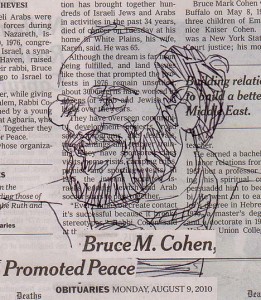Arab citizens of Israel, who were then one of every six Israelis (today one of every five) called a general strike in protest against government land expropriations in the area of Sakhnin (Fire Zone #9). Most of the Arab villages that remained in Israel after the founding of the state and the War of Independence lost most of their land in the 1950s and ‘60s, which was mostly given to kibbutzim, moshavim, nearby towns and cities and the Jewish National Fund forests.
The expropriations of the mid-1970s were part of a larger plan of “Judaizing the Galilee.” This sinister Israeli plan against the Arab citizens of Israel, written by Yisrael Koenig, director of the Interior Ministry’s Northern District, related to Israel’s Arab citizens as a threat to the State of Israel.
On Land Day, March 31, 1976, at the end of a day of protest and anger, six Israeli Arab citizens were killed by the Israel Police. The events of Land Day shocked Rabbi Cohen, who as a social activist then decided that something had to be done to create understanding and a better future for the relations between the Jewish and Arab citizens of Israel. Bruce created Interns for Peace as a platform to train Jews and Arabs in cross-cultural, cross-communal bridge building. I was the first person to sign up and was among the first group of Jews and Arabs to graduate from the program.
Back in the ‘70s and ‘80s the gaps in just about every field between the Jewish and Arab citizens of Israel were much larger than today. There is no doubt that in most areas there has been real progress toward greater equality in Israel. When I lived in Kafr Qara, which then about 8,500 residents, there almost no public services, the schools were very underfunded, understaffed and at a very low level.
There were four telephones in the whole village.
Now of course everyone has the world in the palm of their hand, and that world has become a lot smaller.
But at the same time, it seems the distance between Jews and Arabs in Israel has grown deeper and wider.
For example, there are many more Arab students, especially young Arab women, at all of the universities and colleges in Israel today, but very few of them have social relationships and interactions with their Jewish fellow students. Most Jewish Israelis are still afraid to visit Arabs towns in Israel, and the most frequent question I was asked when I lived in Kafr Qara was “aren’t you afraid?” I was not then nor am I today, nor should we be afraid. This kind of fear emanates mostly from a lack of knowledge and lack of contact.
Israel’s first president, Chaim Weizmann, said that Israel’s democracy would be determined by how it treats its Arab citizens. Granted, Israel is one of the better places in the Middle East to be an Arab today, in terms of democratic rights and in economic terms, but the real comparison should not be made between Israel’s Arab citizens and citizens of Syria, or Egypt or even their brothers and sisters in the West Bank and Gaza. They are citizens of Israel and the comparisons should be made with Israel’s Jewish citizens. At that level there remains genuine discrimination and unacceptable gaps after 70 years of statehood.
The relations between Jews and Arabs in Israel are difficult and as long as the Israeli-Palestinian conflict is ongoing, the Arab citizens of Israel will continue to be related to as “suspects.” Their loyalty to their people, the Palestinians, will remain a central part of their identity which then puts into question their loyalty to their state.
But their state defines itself as the nation-state of the Jewish people – how can they ever feel a full part of the place where they were born and where their ancestors come from? They see that the new Jewish immigrant from France or Russia or Ethiopia is considered by the state more Israeli than they are. As the Jewish nation-state the symbols of the state are Jewish, they are not agnostic or neutral. Independence Day for the Arab citizens of Israel will always also be Nakba day, which commemorates the catastrophe which befell their people when Israel was born.
Even this coming memorial day for the assassination of prime minister Yitzhak Rabin is being presented under the banner “we are one people” – but that is not true. We are two peoples – Jews and Arabs – all citizens of Israel. When the backers and organizers of the memorial for Rabin conceived of the slogan did they think “we are one people – the people of the State of Israel, Jews and Arabs?” I doubt it.
Whether or not the Israeli Palestinian conflict will eventually be resolved by one state, two states or three states – the State of Israel will remain with a very large community of non-Jewish Arab Palestinian citizens. Yes, Israel is the nation-state of the Jewish people, but it must also be the state of all of its citizens. Twenty percent of the citizens of the state cannot be marginalized and ideologically prevented being able to relate to their state where they hold citizenship as a birthright as not belonging to that state.
Israel belongs to the Arab citizens of Israel as much as it belongs to its Jewish citizens. The challenge facing the state and all of its citizens is to create a partnership of ownership and responsibility in making this country the best place where all of us wish to continue to live and to raise our children.


